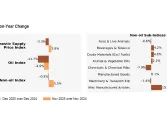
Why Japanese restaurants are accelerating overseas expansion
Recently, sushi chain Kura Sushi announced plans to open 100 stores across China.
Expanding overseas is the main strategy of most Japanese foodservice operators as local consumer sectors continue to be impacted by inflationary pressures and economic uncertainty that stifles consumer spending, an analyst from GlobalData said.
The report revealed that Japanese operators are accelerating overseas expansion even as the domestic foodservice sector is set to expand by a value compound annual growth rate (CAGR) of 10% over 2023–2027
“With consumers dining out more often, the Japanese foodservice sector is recuperating from the impact of the pandemic. However, inflationary pressures and economic uncertainty are stifling consumer spending. As they operate at a higher cost-price ratio than conventional sushi restaurants, Kaiten-zushi restaurants are bearing the brunt of the surge in seafood prices due to the Russia–Ukraine conflict, rising competition with China for seafood catch and supplies, and the global climate change phenomenon. Moreover, fierce competition among outlets and an ongoing labor crunch are constraining the growth of per-outlet transaction revenues. The rapidly greying populace and shrinking working class cloud the long-term outlook of sushi quick service restaurants (QSRs),” Tim Hill, Key Account Director at GlobalData Singapore, said.
Recently, Kura Sushi, which operates 541 conveyor-belt sushi outlets in Japan, 47 in the US and 51 in Taiwan, announced the opening of a new outlet in China, with the goal of opening 100 stores across China by the end of the decade, in line with its plan to expand its overseas locations to 400 stores, and worldwide network to 1,000 outlets by 2030.
“In sharp contrast to Japan, both the Chinese and US foodservice sectors rebounded from the pandemic lull in 2021 and 2022, respectively, in terms of transaction numbers and revenues. As a result, Japanese foodservice operators are setting their sights on bluer oceans abroad, particularly larger overseas markets with high-spending crowds, such as China and the US, which offer more dollar revenue opportunities than Japan. By expanding overseas, these operators can thereby accelerate their post-COVID-19 recovery and ensure long-term business continuity,” Bobby Verghese, Consumer Analyst at GlobalData said.

























